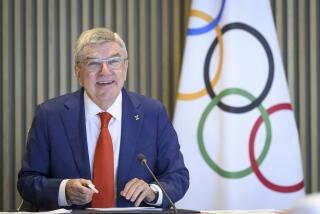ISU Refuses Request to Delay Judge’s Hearing
An attorney for Marie-Reine Le Gougne, the French figure skating judge suspended by the International Skating Union during the Salt Lake City Olympics, said Thursday the ISU’s refusal to postpone a hearing into her alleged misconduct will hamper his defense against charges she acted unethically in judging the pairs event.
“It does put a hardship on us. It does prejudice us,” said Maxwell Miller of Salt Lake City, who is representing Le Gougne. “I’m not sure we’re going to have time to take everyone’s deposition and prepare....
“I think she is a target and a scapegoat, and if there is misconduct, there is misconduct by a lot of people, and it’s unfair for the ISU to single her out.”
Miller said he received an electronic transcript last week of testimony from about 10 witnesses--including fellow judges--interviewed by the ISU regarding events surrounding the pairs competition. Miller said the transcript showed some questions were slanted against Le Gougne, some testimony was contradictory and some obvious questions were not asked.
To interview the ISU’s witnesses and others of his choosing, Miller asked that the hearing--scheduled for April 29-30 in Lausanne, Switzerland--be delayed 30 to 60 days. His request was rejected Thursday. ISU officials could not be reached for comment.
“In reading the list, our feeling was there were inconsistencies and biases in the questioning, and they had made up their minds to use Marie-Reine as a scapegoat,” Miller said. “We were not invited to participate in those depositions.... I’m not sure we’re going to be able to interview all of those people. We asked them to subpoena some people, and there’s a provision under federal law for them to do so.”
Le Gougne, a veteran judge, voted for Russians Elena Berezhnaya and Anton Sikharulidze over Canadians Jamie Sale and David Pelletier in the free skate finale Feb. 11. A 5-4 majority gave the Russian duo the gold medal. However, she later told ISU President Ottavio Cinquanta she had “submitted to a certain pressure” from the French federation to vote for the Russians, although she later denied having been coerced and said she voted her conscience.
The International Olympic Committee, on the recommendation of the ISU, awarded duplicate gold medals to Sale and Pelletier.
Miller also filed complaints with the ISU alleging pairs referee Ron Pfenning and ISU technical committee chair Sally-Anne Stapleford made false accusations and “exercised undue influence” over Le Gougne. Both told Cinquanta they heard Le Gougne say she had been pressured to vote for Berezhnaya and Sikharulidze. Miller also filed a complaint about Canadian judge Benoit Lavoie, who told reporters Le Gougne told him in November she had been pressured to favor the Russians at Salt Lake City. Le Gougne denied having said that, but Miller said Lavoie should be sanctioned for not reporting the alleged conversation to the ISU before the Olympics.
The Olympic judging scandal led Cinquanta to outline sweeping reforms in scoring and judging. But the reforms have not been added to the agenda of the ISU’s June council meeting in Kyoto, Japan.
More to Read
Go beyond the scoreboard
Get the latest on L.A.'s teams in the daily Sports Report newsletter.
You may occasionally receive promotional content from the Los Angeles Times.





